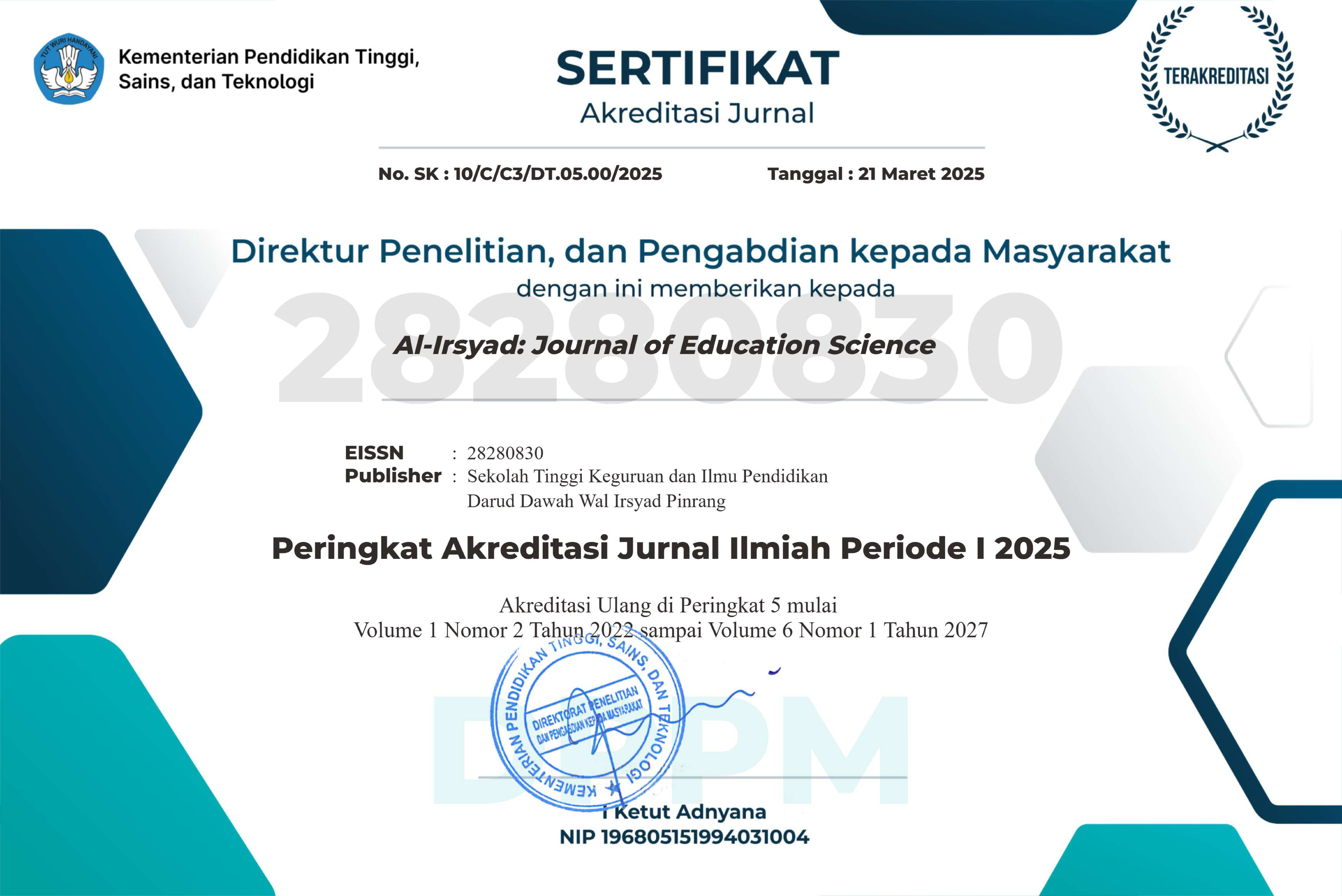INTEGRASI AI DALAM PEMBELAJARAN: PERSEPSI MAHASISWA DAN IMPLIKASINYA TERHADAP PEMBELAJARAN MANDIRI
DOI:
https://doi.org/10.58917/aijes.v5i1.476Kata Kunci:
Kecerdasan Buatan (AI), Pembelajaran Mandiri, Persepsi MahasiswaAbstrak
Perkembangan kecerdasan buatan (AI) menawarkan peluang besar dalam mendukung pembelajaran mandiri mahasiswa. Penelitian ini bertujuan menelaah persepsi mahasiswa terhadap integrasi AI serta implikasinya terhadap kemandirian belajar. Dengan desain quasi-eksperimen non-equivalent control group dan pendekatan mixed methods, penelitian melibatkan 60 mahasiswa Teknologi Pendidikan Universitas Negeri Makassar yang dibagi ke dalam kelompok eksperimen (AI) dan kontrol (konvensional). Data dikumpulkan melalui pre-test, post-test, angket, wawancara, dan observasi. Hasil menunjukkan peningkatan signifikan pada kelompok eksperimen dibanding kontrol (∆=16,70 vs 6,30; p<0,05). Mahasiswa menilai AI positif terutama dalam aspek inisiatif, pencarian informasi, dan refleksi diri, meski muncul kekhawatiran terkait kebergantungan dan validitas informasi. Temuan ini menegaskan bahwa integrasi AI dapat memperkuat pembelajaran mandiri, namun memerlukan dukungan infrastruktur, literasi digital, dan regulasi etis agar implementasinya efektif dan berkelanjutan.
Referensi
Akgun, S., & Greenhow, C. (2022). Artificial intelligence in education: Addressing ethical challenges in K-12 and higher education contexts. AI and Ethics, 2(3), 431–440. https://doi.org/10.1007/s43681-021-00094-y
Bond, M., Marín, V. I., Dolch, C., Bedenlier, S., & Zawacki-Richter, O. (2020). Digital transformation in higher education: International perspectives on learning and teaching. International Journal of Educational Technology in Higher Education, 17(1), 1–16. https://doi.org/10.1186/s41239-020-00224-x
Chen, X., Xie, H., & Hwang, G.-J. (2021). A multi-perspective study on artificial intelligence in education: Learning content, technology, and learning behavior. Interactive Learning Environments, 1–16.
Chen, X., Xie, H., Zou, D., & Hwang, G. J. (2021). Application and theory gaps during the rise of artificial intelligence in education. Computers and Education: Artificial Intelligence, 2, 100006. https://doi.org/10.1016/j.caeai.2021.100006
Dwiastuti, I., & Kartika, M. (2023). Student perception on AI tools in higher education. International Journal of Emerging Technologies in Learning, 18(2), 112–124.
Holmes, W., Porayska-Pomsta, K., Holstein, K., Sutherland, E., Baker, T., Shum, S. B., … Luckin, R. (2021). Ethics of AI in education: Towards a community-wide framework. International Journal of Artificial Intelligence in Education, 31(4), 519–536. https://doi.org/10.1007/s40593-021-00239-7
Holmes, W., Bialik, M., & Fadel, C. (2022). Artificial intelligence in education: Promises and implications for teaching and learning. Center for Curriculum Redesign. https://curriculumredesign.org/wp-content/uploads/AI-in-Education-Promises-and-Implications_CCR-2019.pdf
Huang, R., Tlili, A., Chang, T. W., Zhang, X., & Nascimbeni, F. (2023). Disrupted classes, undisrupted learning: The role of AI and digital technologies in education transformation. Smart Learning Environments, 10(1), 1–17. https://doi.org/10.1186/s40561-023-00245-9
Luckin, R. (2021). Machine learning and human intelligence: The future of education for the 21st century. UCL Press.
Nguyen, T. T., Do, T. H., & Pham, H. T. (2023). University students’ perceptions of artificial intelligence in education: Opportunities, challenges, and future directions. Education and Information Technologies, 28(8), 9791–9810. https://doi.org/10.1007/s10639-023-11724-9
Roll, I., & Wylie, R. (2016). Evolution and revolution in artificial intelligence in education. International Journal of Artificial Intelligence in Education, 26(2), 582–599. https://doi.org/10.1007/s40593-016-0110-3
Siemens, G. (2022). Self-directed learning in the age of artificial intelligence. Routledge.
Sun, H., Wang, Z., & Yu, X. (2022). Exploring the role of AI in promoting self-directed learning. Educational Technology Research and Development, 70(4), 1321–1340.
Tlili, A., Huang, R., Shehata, B., Liu, D., Luo, H., & Yang, J. (2023). What if the devil is my guardian angel: ChatGPT as a case study of using chatbots in education. Smart Learning Environments, 10(1), 1–24. https://doi.org/10.1186/s40561-023-00234-y
UNESCO. (2023). AI and the future of education: Policy brief. United Nations Educational, Scientific and Cultural Organization.
Zawacki-Richter, O., Marín, V. I., Bond, M., & Gouverneur, F. (2019). Systematic review of research on artificial intelligence applications in higher education – where are the educators? International Journal of Educational Technology in Higher Education, 16(1), 1–27. https://doi.org/10.1186/s41239-019-0171-0
Zhai, X., Chu, X., Chai, C. S., Jong, M. S. Y., Istenic, A., Spector, J. M., … & Tsai, C. C. (2021). A review of artificial intelligence in education research (2010–2020). Journal of Educational Technology & Society, 24(3), 27–47.
Zou, D., Huang, R. H., & Xie, H. (2021). Digital transformation in higher education: Implications of artificial intelligence for teaching and learning. Educational Technology & Society, 24(3), 1–14.
Unduhan
Diterbitkan
Cara Mengutip
Terbitan
Bagian
Lisensi
Hak Cipta (c) 2025 Andromeda Valentino Sinaga, Merrisa Monoarfa, Rimma Sianipar

Artikel ini berlisensi Creative Commons Attribution 4.0 International License.























